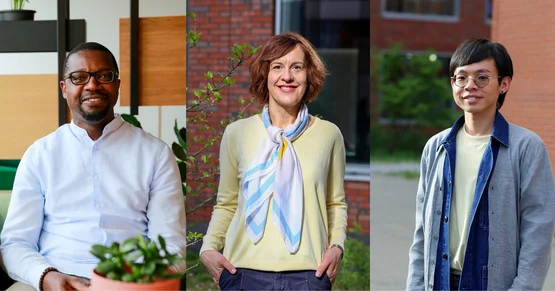MA in Language and Communication
Our MA in Language and Communication equips you with the skills you need to make a strategic impact and assume specialist leadership roles in multilingual, intercultural and digitised professions. In our programme, professional excellence is both demanded and fostered.
Four specialisations allow students to gain a Master's degree and professional qualifications in the areas of
- strategic communication management
- multilingual communication management
- linguistic diversity management
- conference interpreting
In each of these specialisations, you learn to mediate between languages, stakeholders and cultures.
By doing so, you focus on strategic tasks and the added value that humans can provide in a professional world in which artificial intelligence takes care of automatable tasks. You combine creativity and intuition with digital technologies to reach your target groups and move people.
In the core modules, which form the common basis of all specialisations, you systematically reflect on your language use as a professional – thinking outside the box. You gain access to research methods and gather experience in familiarising yourself with new fields. In doing so, you develop a critical understanding of science that benefits your professional practice.
In the specialisation modules, you gain expertise and routine that you can apply on the job. You hone your skills on the basis of current scenarios from professional life. And, under the supervision of experienced mentors, you take part in real projects and assignments in the language and communication industry.
You fine-tune your profile with your Master's thesis and by completing electives in subjects ranging from speaking techniques to leadership skills. By enhancing your theoretical knowledge, practical experience and professional network, you develop your individual competence profile for the next steps in your professional journey – and far beyond.
What's more, those who graduate from the MA in Language and Communication with a good grade not only position themselves excellently in practice, but also qualify for a PhD programme. This provides the option to specialise and excel further in your chosen subject by supplementing your profile with an additional layer of scientific precision.
Am I ready for this Master's programme?
Anyone with a BA in the field of applied linguistics is ideally positioned to do this MA programme. Other university degrees also qualify, but additional credits may be required prior to the commencement of your studies. Further information can be found on the pages of the respective specialisations.
Insights into the degree programme
-

«Übersetzen in Leichte Sprache ist gar nicht so leicht»
Studierende der Mastervertiefung Multilingual Communication Management (bisher: Fachübersetzen) haben für eine Kunstausstellung im Gewerbemuseum Winterthur Texte in Leichte Sprache übersetzt. Was die ...
-

Mit dem Masterstudium in Strategic Communication Management gewappnet für die Nachhaltigkeitskommunikation
Glaubwürdig zu kommunizieren ist für Eva Nebel essentiell in der Nachhaltigkeitskommunikation. Eva ist seit kurzem Communication & Sustainability Specialist bei Holcim Schweiz. Die Absolventin der ...
-

Linguistic Diversity Management: Drei Studierende, drei Perspektiven
Fodé, Jelena und Chih-Han kommen aus verschiedenen Kulturen. Sie sprechen verschiedene Sprachen. Und sie sind die ersten, die im Master Language and Communication die Vertiefung Linguistic Diversity ...
Good to know
What sets a Master's degree apart from a Bachelor's degree in the same professional field?
After gaining your Bachelor's degree, you are well equipped to perform tasks in your professional field in a considered and successful manner. However, the Master's degree takes you much further: you develop your own profile and can take on strategic tasks in an international environment.
How will strategic skills and a personal profile benefit me in my profession?
In the Master's programme, you develop your strengths to the highest standard: you shape your profile, allowing you to find the perfect place in your professional field. Here, you can lead others with your expertise and take strategic decisions in the interest of your organisation and profession – as well as your future career. This pays off.
Why is the focus placed on the international aspect?
Even if you perform your daily activities and work at a local level – making a strategic impact in a globally networked and mobile professional world requires that you can systematically perceive international contexts and incorporate them in your decisions.
Who can complete a PhD after the Master's degree?
Those who graduate from the Master’s programme with a grade of at least 5 qualify for the PhD in Applied Linguistics, which the ZHAW offers together with partners. A doctorate in this programme will set you apart worldwide as an expert in your chosen area of specialisation and as somebody who possesses profound knowledge and a sophisticated skill set.
In brief
Title: Master of Arts ZHAW in Language and Communication
Specialisations: strategic communication management, multilingual communication management, linguistic diversity management or conference interpreting
Workload: 90 ECTS credits
Study mode: full-time or part-time
Duration: 3 semesters (full-time), 4-6 semesters (part-time)
Programme start: Spring semester
Admission requirements: dependent on chosen specialisation
Deadline for applications: dependent on chosen specialisation
Location: Winterthur
Languages of instruction: Most of the core modules are taught in German, some in English. The translation and interpreting modules are taught in the respective target language. In the specialisation in strategic communication management, second semester modules are taught in English.
Tuition fees: CHF 720 per semester + additional study-related expenses
